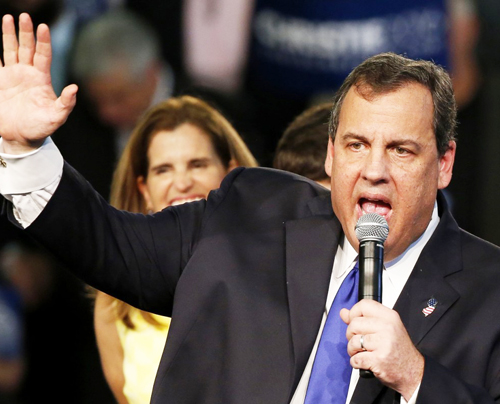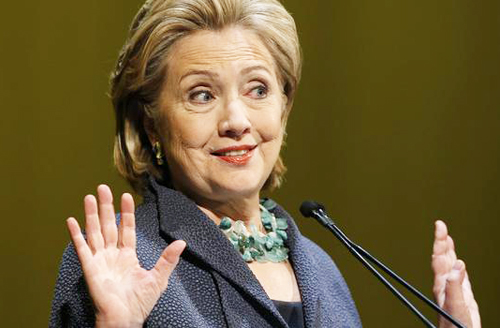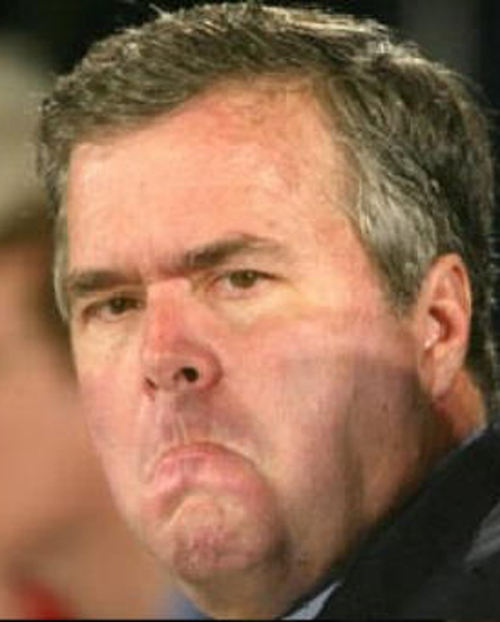MEDIA WATCH: Mindless corporate media coverage of presidential politics... '...when it comes to education, policies once seen as conservative � high-stakes testing, closing public schools and replacing them with charters, weakening teacher�s unions � share a generally bipartisan consensus...'
 New Jersey governor Chris Christie.FAIR has done a major job in covering how mindlessly corporate media -- including The New York Times and The Washington Post -- is covering the presidential election. The FAIR report notes that the cliches of corporate reformers are repeated by both the Republican and Democratic candidates -- and no reporter asks critical questions. Substance readers can learn more by going to the FAIR website: URL... http://fair.org/home/when-candidates-talk-education-media-rarely-go-beyond-buzzwords/
New Jersey governor Chris Christie.FAIR has done a major job in covering how mindlessly corporate media -- including The New York Times and The Washington Post -- is covering the presidential election. The FAIR report notes that the cliches of corporate reformers are repeated by both the Republican and Democratic candidates -- and no reporter asks critical questions. Substance readers can learn more by going to the FAIR website: URL... http://fair.org/home/when-candidates-talk-education-media-rarely-go-beyond-buzzwords/
The FAIR education report follows:
When Candidates Talk Education, Media Rarely Go Beyond Buzzwords
Despite the nonstop coverage of the 2016 presidential election � still 16 months away � it can be difficult to sort out the actual policy differences between the candidates. That�s especially true when it comes to education, where policies once seen as conservative � high-stakes standardized testing, closing public schools and replacing them with charters, weakening teacher�s unions � now share a generally bipartisan consensus in the political establishment.
Buzzwords and phrases like �accountability,� �Common Core� and �school choice� abound in media coverage of candidates� education policy, with little explanation provided to actually unpack what it means that a candidate is pro or con these things. In a media landscape focused on the differences between Democrats and Republicans, rather than a comprehensive understanding of the policies at hand, only a small fraction of what�s at stake in education actually get covered.
In order to understand the limits of the education coverage thus far in the 2016 campaign, it�s important to recognize the key players in the national debate around education policy. So-called �education reformers��often lead by wealthy hedge-fund managers and business leaders�have successfully established a mainstream consensus: Public schools are failing (despite abundant evidence to the contrary), those failing schools should be closed and taken over or replaced by privately run management and/or charter schools, teachers need harsher evaluations and merit pay, and teachers unions impede educational progress by protecting �bad� teachers.
This is straight out of the No Child Left Behind playbook, but such beliefs are no longer the domain of George W. Bush-style Republicans. The Obama administration has entrenched education policies like high-stakes standardized testing in its Race to the Top grant program and Common Core State Standards. Opposite the education reformers, and the politicians in both major parties who champion them, are those who advocate that the public school system be protected rather than dismantled�most notably, public school teachers.
 Hillary Clinton has avoided the press and refuses to denounce Common Core.As more candidates join the presidential race, newspapers must find the horserace angle in covering their K-12 education platforms, which range from nonexistent to vague to reactionary. In the New York Times� ongoing �On the Issues� series, education is only included in four of the 18 candidate profiles: George Pataki (5/28/15), Jeb Bush (6/15/15), Bobby Jindal (6/24/15) and Chris Christie (6/30/15). The only policy mentioned is Common Core�Christie, Jindal and Pataki oppose the standards, although Christie and Jindal both formerly supported them. Jeb Bush supports the standards, �which were intended to raise proficiency in math and English,� despite them having �generated a strong backlash among conservatives who see Common Core as an overreach by the federal government.�
Hillary Clinton has avoided the press and refuses to denounce Common Core.As more candidates join the presidential race, newspapers must find the horserace angle in covering their K-12 education platforms, which range from nonexistent to vague to reactionary. In the New York Times� ongoing �On the Issues� series, education is only included in four of the 18 candidate profiles: George Pataki (5/28/15), Jeb Bush (6/15/15), Bobby Jindal (6/24/15) and Chris Christie (6/30/15). The only policy mentioned is Common Core�Christie, Jindal and Pataki oppose the standards, although Christie and Jindal both formerly supported them. Jeb Bush supports the standards, �which were intended to raise proficiency in math and English,� despite them having �generated a strong backlash among conservatives who see Common Core as an overreach by the federal government.�
While the profiles highlight Christie and Jindal�s reversal on the issue, there�s little explanation of the standards themselves. Bush is quoted: �Raising expectations and having accurate assessments of where kids are is essential for success.� A 2012 quote from Jindal in which he claims the standards �raise expectations for every child� is included to illustrate his changed position.
This type of coverage reduces an issue to a candidates� stance on it, regardless of what evidence (or lack thereof) informs that stance. Bush believes that Common Core raises expectations; Jindal used to believe that but changed his mind. Whether those stances are based on actual, knowable information about how the standards affect teaching and learning is beside the point.
New Jersey Governor and Presidential Candidate Chris Christie (Julio Cortez, AP, June 30, 2015)
The Washington Post�s coverage of Chris Christie�s education program emphasized that he �flip-flopped� on Common Core�without examining the merits of being for or against it. (photo: Julio Cortez/AP)
The Washington Post�s coverage of Republican candidates and the Common Core also fixates on political flipping and flopping without explaining the education-related criticisms of the standards themselves. On Christie (6/30/15): �He flip-flopped on Common Core, giving in to overblown right-wing objections to the state-driven educational standards.� On Jindal (6/24/15): �He flipped against the Common Core education standards.� On Jindal again (6/25/15): �Imagine if instead, Jindal had not, for example, flip-flopped on Common Core.�
And in an informative article (7/1/15) on the self-interest of the for-profit companies fueling Jeb Bush�s education organization, the �raised expectations� claim is repeated with neither supporting nor counter-evidence:
The organization touts a series of reforms across the country that have led to �rising student achievement��and it is through this organization that Bush became a national advocate for the Common Core education standards adopted by more than 40 states and the District of Columbia.
The differences among the Republicans revolve largely around just how critical of the federal government a candidate is willing to be. The media coverage reflects the limits of that dichotomy: Is Common Core bad because of government overreach, or is it good because it �raises expectations�? What those �raised expectations� are, whether they are developmentally and culturally inclusive, and how they�re impacting students with disabilities, English Language Learners and kindergarteners, does not follow.
Hillary Clinton (photo: Ian Thomas Jansen-Lonnquist/NYT)
In discussing Hillary Clinton�s education stance, the New York Times used the word �overhaul� to gloss over the policies that are actually being debated for public schools. (photo: Ian Thomas Jansen-Lonnquist/NYT)
A similarly vague euphemism appears in several New York Times stories on the education platform of Hillary Clinton, who is running as a member of a party historically supported by teachers unions but newly seized by education reformers. The word �overhaul� is used to describe the reform agenda (6/4/15): �Mrs. Clinton is under some pressure from advocates of an education overhaul, who have been at odds with the teachers� union for several years and believe President Obama has been a supporter of their issues.�
From the same article: �Ann O�Leary, who has since become a senior policy adviser for Mrs. Clinton�s campaign, indicated that the candidate planned to engage in a dialogue with both the teachers and advocates of an overhaul� and �Mrs. Clinton has a long record on the subject, including on efforts to overhaul public education.�
 Jeb Bush's Florida education work is largely being ignored by reporters, who simply repeat the claims of the "Florida Miracle." An article from March (3/24/15) exploring the Democratic divide between ed reformers and union members uses the same language:
Jeb Bush's Florida education work is largely being ignored by reporters, who simply repeat the claims of the "Florida Miracle." An article from March (3/24/15) exploring the Democratic divide between ed reformers and union members uses the same language:
The outcome is particularly important for advocates of an overhaul, whose movement has faced growing opposition the past few years. Political crosswinds have whipped up from both the right and the left, particularly over the Common Core education standards that more than 40 states have put in place, but also over Race to the Top, the Obama administration�s program to reward school districts that improve, using measurements that union leaders often find controversial.
One again, the measurements that union leaders find controversial�namely, pseudo-scientific �value-added� testing�are not identified. Nor are the specifics of the �overhaul� being advocated for: closing public schools. If that sounds like an unsupported claim, it�s right there on the website of Democrats for Education Reform, quoted twice in the aforementioned article (and described as a �leading left-of-center advocacy group on the subject�), where �close down failing schools� is the first bullet point under its �What We Stand For� page.
In another story from the Times (3/13/15), David Leonhardt dismisses parent, student and teacher criticisms of high stakes standardized testing:
Yet many students, parents and teachers have also grown frustrated by the amount of standardized testing. Some of this frustration stems from the fact that accountability isn�t fun.
It sounds entirely selfish and illogical to be opposed to �accountability,� especially when the practices shielded under this euphemism are closing schools, firing teachers and linking student grade promotions to test scores rather than overall academic performance. The uncritical repetition of language like �raised expectations,� �overhaul public education� and �accountability� legitimizes the destructive ideas and exclusionary practices being described.
The 2016 election is an important one for education policy, as privately funded reformers continue to successfully dominate both the political and media narrative. There is a tremendous amount of research and reporting from experts and educators on the impact of Common Core, school closures and charter expansion. When reporting on the often shallow, hypocritical or self-interested talking points put forward by the candidates, it�s media�s responsibility to correct the inaccuracies, explain the buzzwords, and illuminate the impact of the policies being pushed on children, families and teachers.
Molly Knefel is a journalist and co-host of the daily political podcast Radio Dispatch. She is also an elementary after-school teacher at a public school in the Bronx.

